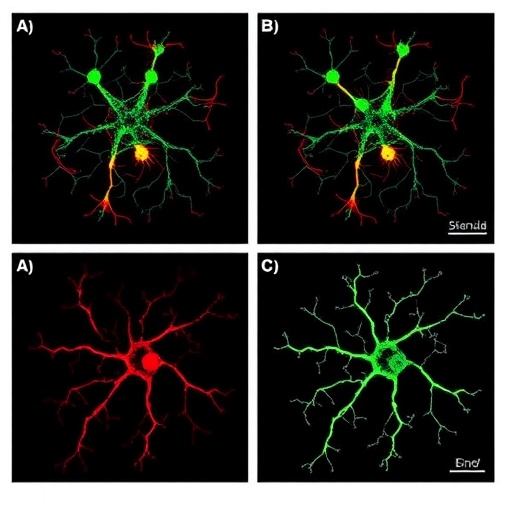In a groundbreaking study that could reshape our understanding of metabolic processes within the brain, researchers have unveiled the intricate relationship between sexual dimorphism and neurodevelopment. The investigation, led by an esteemed team consisting of Cabral-da-Silva, Zanesco, Valdivieso-Rivera, and others, delves into the functional implications of hypothalamic Fezf1 neuron-specific BDNF (brain-derived neurotrophic factor) knockout in male and female subjects. This comprehensive exploration aims to illuminate the biological underpinnings that contribute to sex-based differences in metabolism and energy regulation.
At the heart of this research is the hypothalamus, a small but vital brain region responsible for hormone production and regulation of various autonomic functions. The hypothalamus has long been recognized for its role in the control of hunger, thirst, and temperature regulation, yet its influence on metabolic pathways, particularly regarding sexual dimorphism, has only begun to be fully understood. With the identification of Fezf1 neurons as critical players in this domain, the study seeks to uncover how the absence of BDNF within these neurons may instigate significant metabolic changes that manifest differently between sexes.
Metabolic sexual dimorphism refers to the varying ways in which male and female bodies metabolize energy and process nutrients. This phenomenon is not merely a biological curiosity but a determining factor that influences health outcomes across the lifespan. Indeed, the divergence in metabolic responses can lead to a spectrum of conditions, from obesity to diabetes. By focusing on the nullification of BDNF within Fezf1 neurons—key components in neuronal communication and energy homeostasis—the research addresses critical questions regarding how these factors contribute to such disparities in metabolic health.
Experimental methodologies employed in this research included advanced genetic manipulations, allowing for the targeted deletion of BDNF in Fezf1 neurons specifically. Such techniques necessitate precise scientific acumen, ensuring that the integrity of other neurobiological functions remains intact while isolating the effects of BDNF loss. The researchers meticulously monitored metabolic metrics in both male and female knockout models, scrutinizing how energy homeostasis, appetite regulation, and overall metabolic rate diverged in the absence of BDNF.
Initial findings point toward a remarkable disparity between male and female subjects when BDNF is knocked out in Fezf1 neurons. Male models exhibited a pronounced decline in metabolic rates compared to their female counterparts. This indicates that BDNF may play a more pivotal role in maintaining energy balance in males, further enriching our understanding of sex-based differences in metabolism. Such discoveries not only add depth to the current scientific narrative but also propose potential therapeutic avenues for addressing sex-specific metabolic disorders.
The implications of this study extend into the realm of clinical medicine, particularly in the treatment and prevention of diseases linked to metabolic dysfunction. Understanding that metabolic responses and tendencies may vary fundamentally between sexes could aid in the development of more personalized treatment strategies. For instance, weight management programs, dietary interventions, and pharmacological approaches could be distinctly tailored to address these inherent differences, thus maximizing their efficacy.
As the research progresses, the pathway to unraveling the complexities of sexual dimorphism in metabolism remains vibrant with possibilities. The connection between Fezf1 neurons and metabolic regulation serves as a rich tapestry upon which future studies can expand. This could potentially allow for a more nuanced understanding of how developmental biology intersects with endocrinology and metabolism, revealing important insights that could benefit broad segments of the population.
Moreover, the idea that different brain mechanisms govern metabolic processes in males and females opens a dialogue about gender health disparities in broader contexts. The findings invite questions about how sociocultural factors intersect with biology to shape health outcomes. For instance, women and men may respond differently to dietary interventions or exercise regimens, revealing the importance of incorporating biological differences into public health education and messaging.
The journey from basic science to translational applications is fraught with challenges, but the foundational work laid out by Cabral-da-Silva and colleagues enhances our understanding and paves the way for innovations in medical science. The study is an excellent example of how a targeted approach to fundamental research can yield insights with far-reaching implications. It illustrates the need for continued investment in sex-based research, particularly as it pertains to understanding chronic diseases rooted in metabolism.
In light of these discoveries, future research will not only seek to determine the genetic and environmental factors influencing BDNF action in distinct sexes but also explore how lifestyle and diet may modulate these pathways. The convergence of genomics, metabolism, and behavioral science holds the promise for a new frontier in health research.
As researchers digest these findings, they also hope to invite further scientific inquiry into related domains, catching the attention of oncologists, cardiologists, and endocrinologists alike. Each distinct field stands to gain by integrating this nuanced perspective on how male and female biology affects their approach to treatment and understanding of health conditions.
In summary, the investigation into metabolic sexual dimorphism concerning the hypothalamic Fezf1 neuron-specific BDNF knockout reveals exciting opportunities to redefine our approaches to metabolic health across genders. It reminds us that biology is not merely a backdrop against which we study health but a dynamic force that shapes our very understanding of health and disease.
The current study is significant not just for its immediate results but for the expansive dialogue it generates within the scientific community regarding metabolism, neurobiology, and sexual dimorphism. By pushing the boundaries of our knowledge, we are closer than ever to a future where healthcare is individualized and reflects the unique biological narratives we all carry.
Subject of Research: Metabolic sexual dimorphism in hypothalamic Fezf1 neuron-specific BDNF knockout.
Article Title: Metabolic sexual dimorphism in hypothalamic Fezf1 neuron-specific BDNF knockout.
Article References:
Cabral-da-Silva, D., Zanesco, A.M., Valdivieso-Rivera, F. et al. Metabolic sexual dimorphism in hypothalamic Fezf1 neuron-specific BDNF knockout.
Biol Sex Differ 16, 95 (2025). https://doi.org/10.1186/s13293-025-00770-z
Image Credits: AI Generated
DOI: https://doi.org/10.1186/s13293-025-00770-z
Keywords: Metabolism, Sexual Dimorphism, BDNF, Hypothalamus, Neurobiology, Health Disparities.




